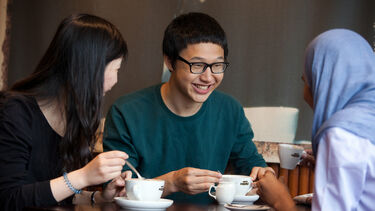My experience at the University of Mannheim

Why did you decide to study abroad?
I wanted to take the opportunity to experience living independently in a foreign country and meet different people from across the world. As an individual, I understood that a year abroad would help develop my existing interpersonal skills but also form new and important ones too. I chose the University of Mannheim because the Politics department is one of the top ranked in German Universities and prides itself for its high standard of research and teaching. I also wanted to advance my German language skills and saw this an ideal opportunity to immerse myself into the culture.
What did you study? How was your learning experience different to şů«Ӱҵ?
I studied Political Science with some modules in International Relations. The learning experience at Mannheim was noticeably different to şů«Ӱҵ, with an emphasis on data analysis and quantitative methods of research. Despite maths and statistics not being my main strengths, I embraced the challenge. The lecturers were accommodating and understanding to international students who weren’t as familiar with quantitative approaches, and provided additional support, so don't let it put you off! Regarding the workload, Mannheim expects more time allocated to studies and this is shown through student inputs in the form of discussion, group work and presentations in class. As each module requires at least one group presentation, I have been able to build up my confidence in public speaking which is an important skill for future job opportunities.
My favourite module was Introduction to International Relations: Gender Studies and Queer Rights in International Relations. This module explored the role of gender and sexuality in international relations. In particular, it explored alternative theories of IR including feminist and queer perspectives. This was interesting to explore other perspectives on security and violence through different and alternative lenses and I was able to deepen my understanding on sexual and gender-based violence within times of war.
What sort of things did you get up to in your free time there?
I was able to travel around Germany during my time there which was such a valuable experience. Not only was it a great break from studying but it also provided me with an insight into the different regional cultures of Germany. Similar to the UK, there is also a North/South divide in Germany. I was able to travel to over 10 cities and towns in Germany, with the help of their great public transport infrastructure! Naturally as a politics student, I was made aware of the 16 different States that comprise federal Germany and each States political affiliations. Prior to living in Germany, I had little knowledge of German politics, therefore, living, studying, and travelling around the country only enhanced my interest in the German political system. As I was in Mannheim during International Women’s Day, I joined their annual march through the city to highlight the gender gap between men and women. This was interesting to compare the Women’s march that I attended in my hometown, Bristol, to that of Mannheim.
How do you think this experience will affect your future career or education prospects?
A degree title with 'International Experience', will certainly enhance my future career and education prospects. Employers understand that a year abroad equips students with valuable skills that will be transferable to the workspace. Generally, a year abroad highlights to an employer the independence and self-sufficiency of a student and their commitment to experiencing new cultures for a longer period of time. Specifically to me and the potential field of work I want to be employed in, the year abroad emphasises my ability to network and make contacts from across the world. Despite not knowing what area I want to work in just yet, I know that I want a job where I can help people. By extending my network of contacts from across the globe and demonstrating that I am a global citizen, I can understand and gain a deeper insight into how people think and work. Moreover, this experience has made it easier for me to acclimatise and adapt to new environments at a quicker pace. This is a useful skill to have gained since employers will be seeking individuals who are able to travel and adjust to demanding new environments.
Lucy's Top Tips for studying abroad:
- Don’t be afraid to ask people for help! More often than not people are willing to help and will give valuable information.
- Everyone is in the same boat and wants to make friends. Everyone is equally as keen to meet new people, especially at the beginning of your year abroad. I often found myself saying yes to every social opportunity so that I could meet as many people as possible!
- Take time for yourself. Sometimes the social and cultural element of a year abroad can be overwhelming and tiring, therefore, it is important to take some time aside from your busy schedule to put some time aside for yourself.
- Be open to trying new food and drinks! By living in a foreign country, you are exposed to a variety of new and exciting foods that can open many opportunities to travel and meet new friends. Mannheim has a large Turkish population, and this meant that I was often out tasting wonderful foods that the city had to offer like the falafel wraps, plus the German beer!
- Just be yourself and be open to new experiences and meeting new people. This will enable you to experience the best year of your life!

International undergraduate scholarships
We offer a generous package of financial support for international undergraduate students, including scholarships worth ÂŁ10,000 towards the annual tuition fee (worth up to ÂŁ40,000 for four-year programmes).
Applications are open for existing offer holders for an undergraduate degree programme starting in autumn 2025.

